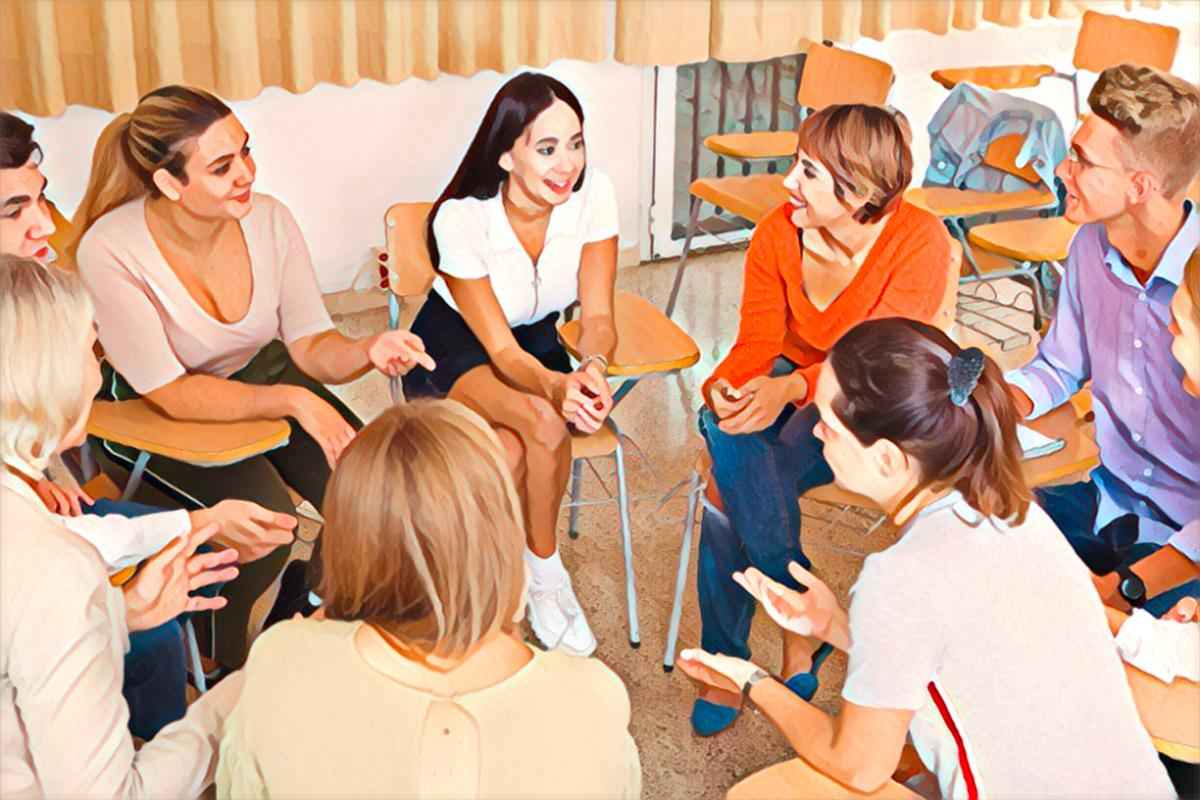
Simple Steps to Better Communication Skills for Business
August 10, 2024
Discover The Best Ways on How to Earn Pocket Money Fast
August 23, 2024The Importance of Group Discussion And its Advantages
Group discussions have been a game-changer for me, and they can be for you too. They are more than just a learning tool; they serve as a compass that guides you toward broader perspectives and deeper understanding. One key advantage of group discussions is that they break the monotony of studying alone. You’re not just passively absorbing information; you’re actively engaging in conversations that spark your curiosity and ignite your intellect. You begin to see different viewpoints, and even if you don’t agree, they challenge your beliefs and push your boundaries.
When I think about the importance of group discussions, I recall my own experiences and those of countless fresh graduates entering the workforce. You’ve probably heard the saying, “Two heads are better than one,” and this couldn’t be truer when it comes to achieving success. Did you know that over 60% of companies in India use group discussions as a key tool for hiring fresh graduates? This statistic highlights the value these discussions hold for both candidates and employers.
Having conducted several group discussions myself, I’ve witnessed how they can transform a candidate’s approach to sharing ideas, engaging with others, and demonstrating their thought processes.
What is Group Discussion?
A group discussion is a collaborative dialogue where participants exchange ideas and viewpoints on a specific topic. It brings people together to share thoughts and insights. Companies often use this method to evaluate candidates’ personalities, skills, and teamwork abilities. Group discussions highlight the importance of communication, teamwork, and problem-solving skills. They are used as a dynamic tool to check how people think on their feet, relate with others, or communicate their ideas.
Participants explore different perspectives on a subject and build on each other’s contributions. One of the key benefit of group discussions is that it enhance learning and foster a deeper understanding of complex issues. For students, participating in these discussions can be enriching, helping them develop critical thinking skills and respect diverse opinions.

Importance of Group Discussion for Students
Group discussion is a powerful tool for personal and professional growth, offering numerous benefits to individuals and organisations. For students, it provides a dynamic platform for exchanging ideas and sharing knowledge, often leading to new insights and innovative solutions. Engaging in group discussions helps students develop essential skills like communication, critical thinking, problem-solving, and collaboration.
These discussions also strengthen teams by fostering trust and respect among participants. The benefits extend beyond the classroom, preparing students for real-world challenges where teamwork and effective communication are vital. In education, the group discussion method encourages active learning and a deeper understanding of subjects, making it a staple in higher education.
The advantages are manifold. Students learn to express their thoughts clearly, listen to diverse viewpoints, and gain a more nuanced understanding of complex topics. This method also helps identify potential issues, like dominant voices overshadowing quieter participants and addresses them effectively.

Types of Group Discussions
Group discussions are a vital part of learning and professional development, offering a platform for dynamic exchange of ideas. They can be broadly categorized into two main types: topic-based and case-based. Understanding these types can help students and professionals harness the full potential of group discussions.
Topic-Based Group Discussions
Topic-based group discussions revolve around a specific subject or theme. Participants delve into various aspects of the topic, sharing their knowledge, perspectives, and insights. This type of discussion is common in academic settings where students are encouraged to explore and debate different viewpoints on subjects ranging from global politics to scientific theories. The purpose of a topic-based group discussion is to develop a deeper understanding of the subject matter and enhance critical thinking skills. By engaging in these discussions, students learn to articulate their thoughts clearly and listen to others with an open mind.
Case-Based Group Discussions
On the other hand, case-based group discussions involve analyzing a scenario or case study. This type is particularly popular in business schools and professional training programs. Participants are presented with a real-world situation and asked to examine it from multiple angles. They identify problems, propose solutions, and discuss the potential outcomes. This method not only sharpens problem-solving skills but also fosters teamwork and collaborative decision-making. It’s an excellent way for students to apply theoretical knowledge to practical situations, preparing them for challenges they might face in their careers.
Factual Group Discussions
Factual group discussions focus on presenting and analyzing factual information. The goal is to arrive at a conclusion or decision based on evidence and data. This type is essential for fields that rely heavily on research and data analysis, such as science and technology. Participants learn to differentiate between opinion and fact, a crucial skill in today’s information-rich world.
Opinion-Based Group Discussions
Lastly, opinion-based group discussions emphasize expressing and exploring personal viewpoints, opinions, and beliefs about a particular topic. These discussions are more subjective and aim to understand diverse perspectives. They are valuable for subjects that don’t have clear-cut answers, like ethics or philosophy. Through these discussions, students develop empathy and learn to appreciate the diversity of thought.

Characteristics of Effective Group Discussions
Group discussions are more than just a conversation; they are a powerful tool for exchanging ideas among a group of people. I remember participating in my first group discussion during college, feeling a mix of excitement and nervousness as we tackled a challenging topic. This dynamic process requires active listening, effective communication, and a spirit of collaboration to truly shine.
Dynamic Exchange of Ideas
Group discussions thrive on the dynamic exchange of ideas. Each participant brings their unique perspective, contributing to a rich tapestry of viewpoints. It’s not just about talking; it’s about listening intently, understanding different angles, and building on each other’s thoughts. This interaction fosters a deeper understanding of the topic at hand and often leads to innovative solutions.
Importance of Active Listening and Effective Communication
Active listening is crucial in group discussions. It means fully engaging with what others are saying, processing their ideas, and responding thoughtfully. Effective communication goes hand in hand with active listening. It’s about expressing your thoughts clearly and concisely, ensuring your points are understood by all. These skills are not only vital for the discussion itself but also for personal and professional growth.
Role of the Leader or Moderator
A productive group discussion often requires a leader or moderator. This person guides the conversation, ensuring that everyone has a chance to speak and that the discussion stays on track. The moderator’s role is to facilitate rather than dominate, helping the group reach a consensus or make a decision. Their presence can make a significant difference in the outcome of the discussion.
Purpose and Benefits
The primary purpose of a group discussion is to reach a consensus or make a decision. However, the benefits extend beyond this. Group discussions are an excellent way to assess candidates’ communication, teamwork, and problem-solving skills. In educational settings, they prepare students for real-world challenges by simulating situations where these skills are essential.

Skills for Successful Group Discussions
Engaging in a group discussion can feel daunting at first, but mastering a few key skills can make all the difference. To excel in these dynamic exchanges, you need a mix of critical thinking, problem-solving, communication skills, and listening abilities. Each of these skills plays a crucial role in ensuring you contribute effectively and shine during the discussion.
Critical Thinking and Problem-Solving
Critical thinking is essential for productive group discussions, allowing for the analysis of topics from various angles, evaluation of evidence, and logical conclusion formulation. It fosters reasoned arguments and creative problem-solving, empowering individuals to tackle challenges confidently.
Effective Communication Skills
Effective communication skills are vital for connecting your thoughts with the group’s understanding, and ensuring your ideas are heard and valued. It’s not just about clarity in speech; the right tone and body language are essential for conveying your message and can significantly impact discussions.
Active Listening Abilities
Active listening is essential in group discussions, as it entails focusing on the speaker, understanding their message, and responding thoughtfully. This practice fosters respect for diverse viewpoints and enhances collaboration, enabling participants to build on ideas and contribute meaningfully.
Adaptability and Quick Thinking
Adaptability is crucial in group discussions, as conversations can shift unexpectedly. Quick thinking allows you to respond effectively to new information or counterarguments, showcasing your engagement and ability to contribute meaningfully to the dialogue.

Preparing for Success
Knowing the skills evaluated in a group discussion can help you prepare and improve. Practice makes perfect, so engage in mock discussions, seek feedback, and work on areas that need improvement. The more you practice, the more confident you’ll become in your abilities.
Group discussions can be a powerful way to share ideas, learn new perspectives, and demonstrate your skills. However, they also come with pitfalls that can derail your contributions and leave a negative impression. To help you navigate these waters, here are some common mistakes to avoid.
Don’t Dominate the Conversation
It’s crucial to remember that a group discussion is a collaborative effort. Dominating the conversation not only stifles others’ input but also makes you seem overbearing. Let others speak, listen actively, and contribute thoughtfully without overshadowing the group.
Avoid Interrupting Others
Interrupting others while they are speaking is not only rude but also disruptive to the flow of the discussion. Practice patience and wait for your turn to speak. This shows respect for your peers and enhances the overall quality of the conversation.
Be Prepared and Informed
Entering a group discussion without adequate preparation can quickly reveal your lack of knowledge. Take time to understand the topic, gather relevant information, and form your opinions. Being well-prepared allows you to contribute meaningfully and confidently.
Stay Positive and Open-Minded
Negativity and criticism can kill the spirit of any discussion. Avoid being overly critical of others’ ideas. Instead, offer constructive feedback and be open to different viewpoints. This creates a positive atmosphere where everyone feels valued and heard.
Professionalism Matters
Your behaviour during a group discussion reflects your professionalism. Being late, unprepared, or displaying unprofessional behaviour can leave a lasting negative impression. Arrive on time, be courteous, and maintain a professional demeanour throughout the discussion.
Respect Others’ Opinions
Group discussions are about exchanging ideas, not winning arguments. Don’t be defensive or dismissive of others’ opinions. Engage with differing viewpoints respectfully and use them as opportunities to broaden your understanding.
Be Original
Lastly, avoid copying or simply agreeing with others’ comments without adding your perspective. Originality shows that you are engaged and capable of independent thinking. It adds value to the discussion and highlights your unique insights.
By avoiding these common mistakes, you can enhance your performance in group discussions, making them more productive and enjoyable for everyone involved.

Group Discussion vs. Debate
Understanding the importance of group discussion in education and communication is essential, especially when comparing it to debates. Group discussion is an engaging activity where participants collaboratively explore issues and ideas, aiming to reach a shared conclusion. This method promotes the benefits of group discussions by allowing everyone to contribute their perspectives, fostering a deeper understanding of the topic at hand. It’s a powerful way to harness collective knowledge and problem-solving skills, making it invaluable in educational settings and beyond.
In contrast, a debate is a formal contest where two sides argue for or against a particular topic, with one side emerging as the winner. While debates focus on persuasion and defending a position, group discussions emphasize collaboration and consensus-building. The purpose of a group discussion is to unite participants on a common platform, encouraging them to share their ideas openly and constructively. This approach nurtures communication skills and critical thinking, key components in the group discussion method.

Benefits of Group Discussion in College
Group discussions in college offer a multitude of benefits that extend far beyond the classroom.
Enhances Social Skills
- Interaction with Peers: Engaging in group discussions allows students to interact with their peers, fostering better communication and understanding.
- Develops Communication Skills: This method of learning is not just about sharing knowledge; it’s about developing critical thinking and problem-solving skills.
Promotes Active Learning
- Deep Understanding: Instead of passively absorbing information, students actively engage with the material, leading to a deeper understanding and retention of knowledge.
- Teamwork and Collaboration: Active participation is crucial in developing teamwork and collaboration skills, which are essential in both academic and professional settings.
Builds Confidence
- Public Speaking: Speaking up in a group setting helps students overcome the fear of public speaking and develop the ability to articulate their thoughts clearly and confidently.
- Critical Thinking: Group discussions encourage students to think on their feet and defend their viewpoints, preparing them for real-world challenges.
Develops Critical Skills
- Problem-Solving: Students learn to evaluate information critically and formulate their own informed opinions through different perspectives.
- Decision Making: Discussing various viewpoints helps in building strong decision-making skills.
Boosts Educational Development
- Holistic Growth: The importance of group discussion in education lies in its ability to aid in the holistic development of students, equipping them with essential life skills.
- Preparation for Future: These discussions prepare students for future success by helping them develop skills necessary for both academic and professional growth.
Group discussions are a powerful tool that aids in the comprehensive development of students, making them confident, critical thinkers, and effective communicators.

Benefits of Group Discussion in Business
Group discussions play a crucial role in the business world, fostering collaboration, and driving innovation. The following are it’s benefits in a corporate environment: –
- Develop New Strategies: Group discussions are essential for brainstorming and creating new strategies that can drive business success.
- Find Solutions to Problems: They provide a platform for employees to collectively address and solve complex problems.
- Promote Teamwork: Group discussions encourage teamwork by bringing together different perspectives and fostering a collaborative environment.
- Enhance Communication: These discussions improve communication skills among employees, ensuring that ideas are shared clearly and effectively.
- Make Informed Decisions: By considering diverse viewpoints, businesses can make more informed and balanced decisions.
- Foster Creative Thinking: Group discussions stimulate creative thinking, encouraging employees to think outside the box and generate innovative ideas.
- Boost Innovation: The collaborative nature of group discussions leads to the development of new and innovative solutions.
- Increase Adaptability: They help businesses remain adaptable by enabling quick and effective responses to market changes.
- Support Personal Growth: Participating in group discussions helps individuals develop important skills such as problem-solving, communication, and teamwork.
- Professional Development: These discussions are a valuable tool for personal and professional growth, benefiting both individuals and the organization as a whole.
Conclusion
Mastering group discussions is crucial for students, job seekers, and professionals alike. The importance of group discussion lies in its ability to enhance communication, critical thinking, and teamwork. Engaging in these discussions not only improves your confidence but also hones your problem-solving skills. The benefits of group discussions are immense, from personal growth to professional development. Whether you’re in education or the business world, the group discussion method is a powerful tool for self-development. Embrace it, and you’ll see significant advantages in both your personal and professional life.




